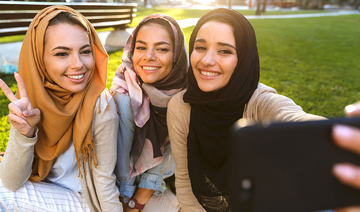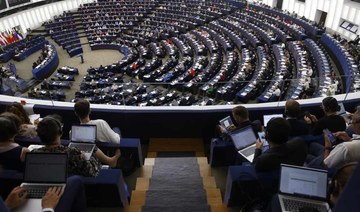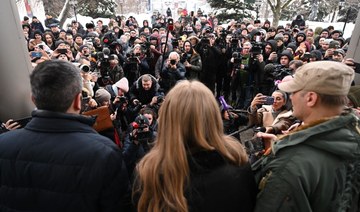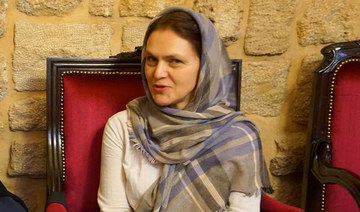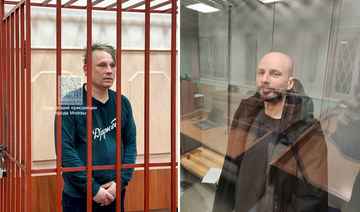LONDON: European countries have, in recent years, been increasingly enacting social media laws that fight unrealistic beauty standards and promote body positivity at a time when influencers are dominating the beauty scene.
Whether such laws on unrealistic body images could be translated to the Arab world remains unclear, however.
Norway last week introduced new legislation requiring influencers and advertisers to declare when images they shared had been edited or retouched.
When asked if this law could be enacted in the Arab world, influencer Danae Mercer replied that the law was “interesting but complex.”
Mercer, who is based in Dubai, is an advocate for natural beauty. While she believed that such a law was a step in the right direction in the region, she said that Norway’s approach was not as straightforward as the UK’s.
“With the UK’s decision to ban filters in advertising, the approach felt more clean cut,” she said. “It’s basically saying you can’t falsely market, which isn’t allowed anywhere.”
Social media influencer, Ameni Esseibi, felt extremely positive about the law. “I personally think that this law is great news for our industry, I can’t wait for it to be applied in the UAE also. It’s time for people to see reality and to accept real life and stop living in a bubble” she said.
Esseibi, who is based in the UAE, describes herself as the first curvy model in the MENA region and is a strong advocate of body positivity.
“People need to wake up and save the younger generation it’s already damaged by the harsh world we live in, let’s try to make easier for them at least on this and not make it harder and impossible,” she added.
Dr. Jad Melki, an associate professor of journalism and media studies at the Lebanese American University and director of the Institute of Media Research and Training, said that disclosing whether a photo had been edited had long been an ethical standard for most professional news institutions, particularly in the US.
“Extending this to social media influencers is certainly good for improving transparency but making it law is going to be hard to enforce, especially in the Arab region,” he told Arab News.
Government agencies across the region did not respond to queries about whether their countries would enact such a law.
In early 2021, the UK’s Advertising Standards Authority issued a decision that effectively banned influencers from using unrealistic beauty filters in advertisements.
Instagram introduced augmented reality (AR) filters, or face filters, in 2017 to compete with Snapchat. Filters were initially limited to fun touches such as animal ears, nerd glasses or a butterfly crown.
But, as the app developed, Instagram began allowing users to create their own filters. However, they have to adhere to both Instagram’s community guidelines and Spark AR policies. The new filters then go through an approval process before going live in the Spark AR Effects Gallery on Instagram.
But what started with flower crowns and puppy filters has become much more complex. Filters can now allow users to conceal faces, soften skin, hide blemishes, give bigger and brighter eyes, puff up lips and shrink noses.
“Studies have shown just how much seeing online perfection is warping our sense of self,” Mercer said. “And with apps like TikTok, where filters are pretty much built in, it can become more and more difficult to be comfortable with a regular unfiltered photo.”
Research has found that Instagram use in the US, specifically exposure to filtered and idealized Instagram images, has been linked to body dissatisfaction and body negativity among women aged between 18-29.
A 2020 study on Instagram’s role in propagating unrealistic beauty standards highlighted that prominent beauty influencers had increasingly played a part in propagating unrealistic beauty standards online.
While the name of a certain filter can be displayed clearly at the top of a story, it does not necessarily mean that people have not resorted to other ways to hide the use of filters such as posting screenshots of the original filtered photo.
Norway’s newly introduced law will require influencers to put a disclaimer on any image where edits have been made to areas including body size, shape and skin, either through a retouching app like FaceTune or ‘beautifying’ face filters.
However, as Mercer noted, a potentially similar law in the Arab region would be difficult to implement.
“It opens up the question of when does it stop. Will people have to disclose if they’ve had plastic surgery that creates the same effects as filters? What about in films, where they edit and use body adjusting all the time? Or TV? What about traditional media?”
Social media companies have been increasingly trying to introduce features that encourage users to post authentic content that reflects their real selves and to promote positive body images.
Last month Instagram and its parent company Facebook introduced a new feature that allowed users to hide the like counts on posts they shared. This feature is intended to reduce the social pressure that comes with likes.
For their part, social media influencers have started a campaign as a response to the growing unrealistic beauty standards on Instagram. The ‘Instagram vs Reality’ movement features influencers who post two images of themselves side-by-side. One is an ideal Instagram version that is perfectly lit and posed showcasing the best attributes, and the other is the realistic version that features a natural pose.
Many Instagram accounts have popped up with the sole aim of celebrating natural poses and unfiltered images.




